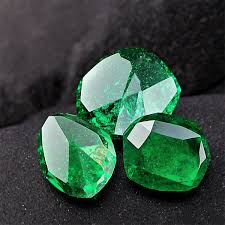Emeralds are a vibrant green variety of the mineral beryl, colored by trace amounts of chromium or vanadium. They are a highly valued gemstone, known for their rich green hue and considered one of the most important gemstones in Vedic astrology. Emeralds are also the birthstone for May.

Key Characteristics:
- Color:The most desirable emeralds exhibit a deep, saturated green color.
- Inclusions:Emeralds typically have inclusions (internal imperfections) that can be seen with the naked eye, often referred to as a “jardin”.
- Hardness:Emeralds have a hardness of 7.5-8 on the Mohs scale, making them relatively durable but still prone to chipping.
- Shape:While many shapes are used, the emerald cut, an octagon with beveled corners, is particularly popular due to its alignment with the hexagonal crystal structure of emeralds.
Uses and Significance:
- Jewelry: Emeralds are widely used in jewelry, particularly in rings, necklaces, and earrings.
- Astrology: In Vedic astrology, emeralds are believed to bring success in business, creative pursuits, and intellectual endeavors.
- Birthstone: Emeralds are the birthstone for the month of May.
Factors Affecting Value:
- Color: Deeper, more saturated green colors are generally more valuable.
- Clarity: While inclusions are common, excessive or poorly placed inclusions can lower value.
- Cut: A well-cut emerald will maximize its color and brilliance.
- Carat Weight: Larger emeralds are rarer and generally more expensive.
Other Notable Points:
- Emeralds are found in various locations around the world, including Colombia, Zambia, and Brazil.
- Natural emeralds have unique color variations and inclusions, making each stone unique.
- Lab-created emeralds are also available and can be a more affordable option
